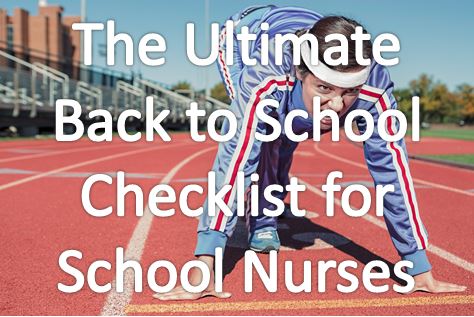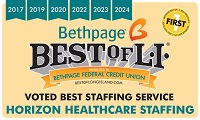The Ultimate Back to School Checklist for School Nurses
Doesn’t it feel like it was just the last day of school? Well the summer is just about over and it’s that time again; time to prepare for the upcoming school year. School nurses have a lot to do before the start of school, and Horizon Healthcare Staffing is here to help you prepare with the ultimate back to school checklist for school nurses. The school nursing office should be organized and ready for students. How you set it up depends on your district / supervisor. Some schools and districts have set rules. While other districts let the nurses have autonomy to organize how they see fit. Just remember nurses, all school districts are different and this is just a guideline!
1.First things first – you want to set up your desk and office space. After being gone for 2+ months, your area might be a bit dusty and dirty. Get those cleaning products out and clean your area. It’s important to start the school year fresh.
2.You most likely received supplies for the year in the summer. You are going to want to unpack, organize, inventory, and put those supplies away.
3.Make sure you have a substitute nurse book prepared and up to date with correct contact information for school support staff. The book should also include students who receive PRN medication and standing orders.
4.Get familiar with your forms. The more you know, the faster you go!
5.Every year school districts receive new students into their schools. It’s important that you identify these students and find out if they have any allergies or conditions that need monitoring, or the types of medications they receive. The last thing you want is to not be prepared when an emergency happens because you did not do your homework. One school nurse kept the glucagon out of the double locked medication cabinet. She chose to put it in a manila envelope in the locked file cabinet under each child’s name. This way in case of an emergency, she can have a staff member get the glucagon without her having to leave the child.
6.You will need to identify students that require your attention. Whether it is diabetes, allergies, or asthma, it is your responsibility to be informed about each student’s IEP / health concerns.
7.For those students that are at risk for emergency conditions, prepare a plan. We can’t stress enough how vital preparation is. Find out who your support team is, have there been any changes made over the summer. In case of an emergency, who responds? Who gets the AED?
8.You will want to reach out to families and healthcare providers to develop a plan for students with health needs. In order to reach out to healthcare providers, you will most likely need to obtain permission from the parent(s) / guardian(s).
9.Set up meetings with teachers to review the students with health concerns. Teachers love visuals, maybe put together a handout to help teachers identify signs / symptoms of their students health concerns
10.Set up a documentation system for the school year. Systems may change from year to year. We can’t stress enough the importance of communication between the nurse and the parents. No matter how minor, nurses should notify the parent of every child they treat – no exceptions!
11.Retrieve immunization records / physicals and confirm the status of incoming students.
12.If there are students that are not up to date or in compliance with their immunizations, it is your responsibility to contact the parents or guardians. Sometimes one phone call won’t do it, remember to keep following up.
13.It’s important to check the locks on the medication storage unit. The last thing you want is to have a rogue student or rogue teacher take medication that doesn’t belong to them. This is one of the most important things you will need to do. That storage unit is yours to guard. Purge any medications from last year. Make sure all incoming medication has MD orders
14.Once you receive the students’ medication (in the original pharmacy vial, labeled with the student’s name, and other essential information), you will want to associate that student with the medication. You can do this by assigning a picture and medical record of the student with the medication. When receiving medication, it is important to do a hand off count with the parent present. Both parent and nurse should sign off on the exact amount of medication given.
15.You will need to check and record the expiration dates of the medications on a regular schedule. Remember your 5 rights, and don’t forget to do a Narcotic Count if needed.
16.School nurses are expected to identify and schedule mandated screenings and the grade levels that require screening.
17.Make sure you know how to use all the screening equipment. Screening equipment includes an eye chart, audiometer, etc.
18.Prepare the schedule for screenings.
19.Create a list of students that will be coming to the health office for glucose testing, nebulizer treatments or any other regularly occurring issue.
20.Create a handy list of these children’s parents’ work and home phone numbers for quick access in an emergency.
21.Know the school’s plan for calling 911 for emergencies so that there is minimal disruption of the school schedule when 911 is called.
22.Be sure it is clear whose responsibility it is to check the school’s AEDs. Know where each one is located.
23.Know who is responsible for signing your time sheets.
24.Horizon nurses are never alone, if you have any questions or if you are unsure – Call the office; it’s not just physicians who make house calls – Horizon Nursing Supervisors are there for you
25.Don’t forget the two most important things for the first day – Coffee and a smile! Relax and have a great year


